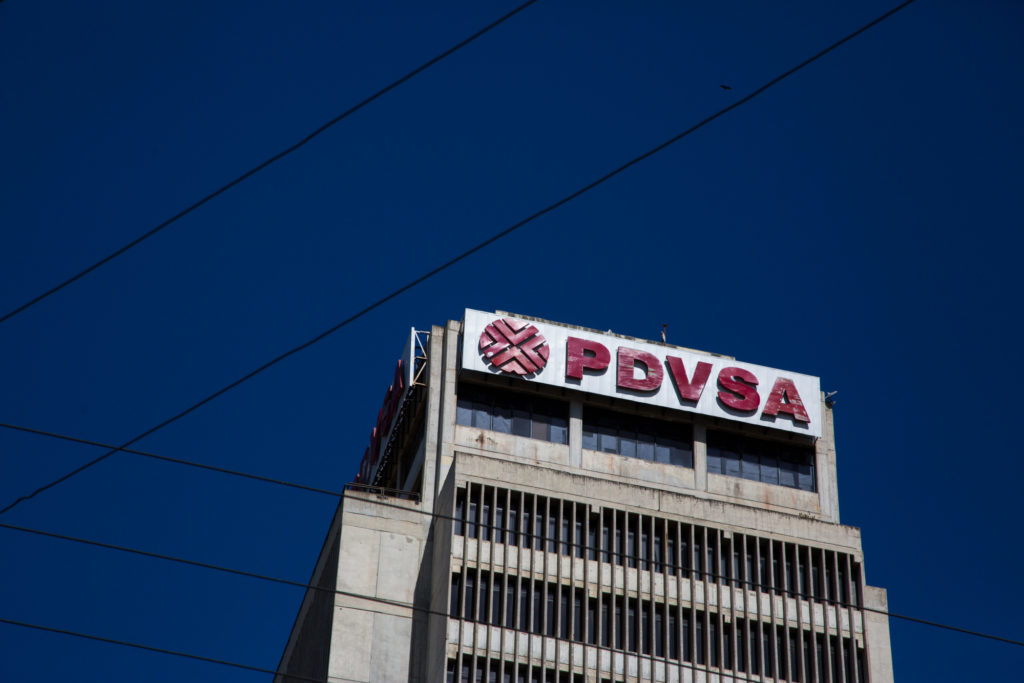
Venezuela’s state-run oil giant failed to erect firewalls that may have kept ConocoPhillips from freezing its oil assets in the Caribbean.
Beset by political and financial chaos at home, Petroleos de Venezuela SA never took legal precautions common for distressed corporate debtors, including protecting cargoes from seizure. PDVSA also lacks the sovereign immunity of a national government that’s helped others slow-walk collections in the past.
The result: Conoco was able to move at light-speed to begin enforcing a $2 billion arbitration award it won last month by freezing PDVSA’s oil exports at key Caribbean harbors. The rapid movement stands in stark contrast to the epic, 15-year battle creditors waged against Argentina earlier in the century.
“If you’re cornered like this, it only leaves room for a big bargain,” said Francisco Monaldi, an expert on Latin American energy policy at Rice University in Houston. PDVSA’s “only real options” are to seek a political accommodation with the U.S. government “or give up the U.S. and European markets entirely.”
Venezuela’s troubles have helped push oil prices to their highest in more than three years. Nonetheless, the U.S. State Department said Wednesday Conoco’s legal actions shouldn’t pose a problem. “There is sufficient oil supply in the global market that countries can access,” spokesman Vincent Campos said in an email.
Hogan Lovells International LLP is the London and Washington-based law firm that has advised PDVSA on financial matters in the past. Following U.S. sanctions last year, though, the firm drastically reduced its presence in Caracas, and has limited its work for Venezuelan clients. Work on the Conoco case was handled by a different firm, said Maria Woehr, a spokeswoman in New York, in an interview Thursday.
Hogan Lovells has closed its Caracas office, she confirmed, but said it still has staff in Venezuela “and will continue to support PDVSA in matters where we are permitted to do work for them” under the sanctions.
An international tribunal ordered PDVSA to pay $2.04 billion in April in connection with the 2007 nationalization of Conoco’s assets. Houston-based Conoco has since won court rulings freezing shipments on the Caribbean islands of Bonaire, Curacao, Aruba and St. Eustatius.
Seeking to expand the pressure to other regions, the world’s biggest independent oil explorer has also filed papers in Hong Kong, Paris, London and New York, Chief Executive Officer Ryan Lance said on Tuesday.
In the Caribbean, Conoco obtained orders that Venezuelan oil not leave local export terminals, pending further legal review. The islands are former Dutch colonies and still a part of the Kingdom of the Netherlands, where the legal system is relatively amenable to such seizure cases, according to Rice University’s Monaldi.
Legal Structures
PDVSA hasn’t erected legal structures that might have prevented seizures of its tankers, according to Monaldi. It hasn’t looked to sell off vulnerable assets or prepare “free-on-board” contracts that designate cargo no longer belongs to the company once it leaves its shores, he said.
The company does have some options remaining. It could challenge the arbitration award issued by the International Chamber of Commerce, potentially stalling seizures for a year or more, Monaldi added.
PDVSA is now seeking a license to carry out ship-to-ship transfers off the coast of Venezuela, as it avoids moving its oil near the Caribbean terminals, according to people with knowledge of the situation.
Oil Production
The legal clash comes as oil production in Venezuela, OPEC’s seventh largest producer, has been plummeting. Output sank to 1.5 million barrels a day in April, down 31 percent from a year earlier, according to government data. Critics say Maduro exacerbated matters with a purge of top management and career bureaucrats at PDVSA, which was put under the oversight of a military general last year.
Argentina’s saga may offer lessons for both sides in the dispute. A phalanx of hedge funds led by Paul Singer’s Elliott Management Corp. spent 15 years trying to collect on the South American country’s debt, from Argentina’s 2001 default through a 2016 settlement.
PDVSA, in theory, can’t claim sovereign immunity to foreign court decisions as Argentina did. It also has more physical assets spread around the world that may be vulnerable to seizure.
Still, Jay Newman, a former money-manager at Elliott who helped oversee the Argentina battle, has a note of caution for Venezuela creditors. PDVSA owes more than $30 billion to bondholders, and Venezuela itself owes nearly $40 billion, he said in an email.
“Legal actions aimed at attaching assets will not be the answer,” said Newman, who’s also a lawyer. “PDVSA does have some unencumbered assets outside of Venezuela, but not nearly enough to begin to satisfy its obligations.